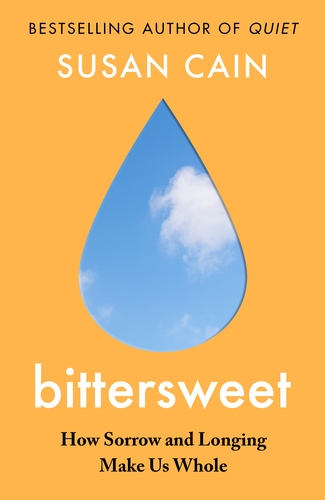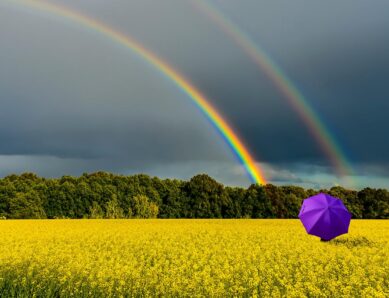When I was four years old, I looked into the field behind my house and saw rainbow trees. There, behind the normal trees, where the light hit just right, the forest turned iridescent.
I was sure the rainbow trees were real and begged my mother to take me back to see them. She didn’t know what I was talking about, but she complied. We walked and walked but never reached the rainbow trees. I persisted in believing they were there, just out of reach, and longing to visit that place someday.
Susan Cain’s “Bittersweet: How Sorrow and Longing Make Us Whole,” describes my childhood feeling as a longing for transcendence. Cain is best known as the bestselling author of a book on introversion called, “Quiet: The Power of Introverts in a World That Can’t Stop Talking.”
“Bittersweet” takes a similarly reflective subject to “Quiet” and focuses on feelings of sorrow and longing, and how these can be constructive and healing – even in cultures where they are undervalued.

Even Sadness Has Its Upsides
Imagine how unusual it would be to find a quiz on Buzzfeed asking, “How Bittersweet Are You?” Cain provides just such a quiz in her book.
I grew out of my belief in the rainbow trees and into a kid who read and read. And then into a teenager and adult who wrote and wrote: melancholy poetry, gloomy songs, and stories and plays about death. So, it shocked me not one bit when I scored highly on Cain’s bittersweetness quiz.
It looks fluffy when you take it, but exploratory research has found correlations between bittersweetness and creativity and spirituality. And on the downside, anxiety and depression.
But there are lots of warnings about the dangers of too much bittersweetness, so it was nice to encounter a book exploring its good side.
Bittersweetness connects us to others, says Cain. It helps us to transcend ourselves. It’s part of being human, stemming from our awareness that life is finite. If we squash down those feelings, we’re missing out on their benefits.
Crying With Laughter
With the rise of TikTok, I’ve watched the publishing world begin to value and capitalize on bittersweetness. In 2021, the New York Times ran an article titled, “How Crying on TikTok Sells Books.”
It’s true: tear-jerking titles and readers’ earnest responses have resulted in a lot of book sales. BookTok has shown that people value this emotional connection and state of mind. (And we probably didn’t need video media to tell us this; Taylor Swift’s popular break-up songs are another example.) Susan Cain’s book goes a long way toward explaining why.
As I watch my play about mortality go into rehearsals and prepare for the e-book launch of my novel about failure, it’s comforting to know that someone finds value in the way I see the world. Especially as someone trying my best to make art and hoping it connects with people.
Finding Comfort in Sadness
Not all of my writing is bittersweet, but I think Cain has identified my personal brand. It’s reassuring to think that I might be doing something useful.
I recently recommended “Bittersweet” to someone I met socially. The result was interesting. At first, her face scrunched up, “A book about sadness?” As I gave more detail, her expression illuminated, “Oh, that makes sense. It’s like when you break up with someone and listen to sad music.”
In the end, we agreed: yes, sadness has value to offer us. And maybe she’ll go on to read the book, or maybe she won’t. Either way, talking about it offered a moment of connection.
Download our “Bittersweet” Book Insight
We review the best new business books and the tested classics in our monthly Book Insights, available as text or as 15-minute audio downloads.
So, if you’re a Mind Tools Club member or corporate user, download or stream the “Bittersweet” Book Insight now!
If you haven’t already signed up, join the Mind Tools Club and gain access to our 2,400+ resources, including 390+ Book Insights. For corporate licensing, ask for a demo with one of our team.
How does sadness affect you? How do you deal with it? Let us know in the comments, below.




